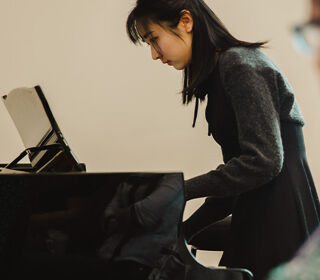
Blog Article

Royal Birmingham Conservatoire welcomes applications from prospective doctoral students in Music and Performing Arts.
Download expression of interest form
As a conservatoire within a modern interdisciplinary university, we provide a unique environment with inclusivity at its core, where staff and students are supported to produce research of the highest quality. The most recent Research Excellence Framework evaluation (2021) judged the majority of our research to be internationally excellent and/or world leading, with 100% of our Impact and Environment evaluation falling into the top two categories (3 and 4*).
Royal Birmingham Conservatoire has a lively community of doctoral researchers, working in a variety of areas across Music and Performing Arts. Our programme offers the flexibility to present your thesis in a range of formats, depending on the nature of your research, whether it be fully text-based (80,000 words) or practical (composition, performance or scholarly edition) with a written element.
We have a broad range of specialisms, particularly centred around our research clusters.
Performing Arts
Royal Birmingham Conservatoire (Acting), through the Centre for Interdisciplinary Performative Arts(CIPA), has expertise in interdisciplinary performance research – including Theatre, Digital Media, Dance and Applied practices. Staff include Prof. Aleksandar Dundjerovic, Dr Polly Hudson, Dr Paola Botham and Dr Gareth Somers, and key areas of specialism are:
- Contemporary performance pedagogies
- Interdisciplinary and multimedia performance
- Theatre making and devising
- Dance performance and making
- EcoSomatics, embodiment studies, and ecological performance practices
- Applied theatre and performance
- Theatre, politics and activism
Composition
Through Royal Birmingham Conservatoire’s Composition and Experimental Performance cluster staff can support a wide range of projects, including Experimental and Conceptual approaches to existing genres, Interdisciplinary and Cross-disciplinary work, and Electronic Composition and Composition involving live electronics. Supervisors include Prof. Joe Cutler (Head of Composition), Dr Andrew Hamilton, Howard Skempton, Prof. Michael Wolters (Deputy Head of Composition), Dr Simon Hall, Professor Lamberto Coccioli, Dr Edmund Hunt and Dr Joe Wright.
Key research concerns and issues include:
- Alternatives to the traditional concert hall
- Composer-led collectives
- The composer as performer
- Queerness and Othering
- Interdisciplinary composition
- Interdisciplinary experimental performance
- Composition with minimal means
- Community engagement as artistic practice
- Conceptual approaches
- Composition and environmental concerns
Musicology
Royal Birmingham Conservatoire has strengths in a wide range of areas of musicology, including:
French Music (within our French Music Research Hub), notably:
- 17th- and 18th-century French music from Lully and Charpentier to Rameau and Chevalier de Saint-Georges (Prof. Shirley Thompson, Prof. Graham Sadler, Christopher Dingle)
- 20th-century French music, notably: Messiaen and his pupils, Dutilleux (Christopher Dingle)
Late Medieval and Renaissance Music (within our Early Music and Sonic Heritage cluster), including:
- Performance Practices of the Renaissance (Prof. Jamie Savan)
- Early Music Theory and Fifteenth-Century Music (Dr Adam Whittaker)
- Music and Historical Soundscapes: interdisciplinary research including digital modelling and archaeoacoustics (Prof. Jamie Savan, Dr Simon Hall; with Dr Islah Ali-MacLachlan, Prof. Carlo Harvey, CEBE Faculty)
17th- and 18th-Century Music (within our Forum for Seventeenth- and Eighteenth-Century Music), notably:
- Performance Practices of the Early Baroque (Prof. Jamie Savan)
- 17th- and 18th-century French music from Lully and Charpentier to Rameau (Prof. Shirley Thompson, Prof. Graham Sadler) (intersecting with our French Music Research Hub)
- Italian Baroque Music (Dr Carrie Churnside)
- British Music in the Eighteenth Century (Dr Martin Perkins)
- Late 18th-century Austro-Germanic music, notably Beethoven (Dr Siân Derry, Dr Matthew Pilcher)
19th- and 20th-Century Music (within our Nineteenth- and Twentieth-Century Music cluster):
- Music Critics and Criticism (Christopher Dingle)
- Piano Performance Practice and Pedagogy in the 19th and 20th Centuries (Dr Siân Derry, Dr Matthew Pilcher, Prof. John Thwaites, Dr Daniel Tong)
- 19th-century Vocal Music (Dr Matthew Pilcher)
- 19th and 20th-century British music including Elgar, Britten, Alan Bush, music and global communism, sound heritage (Dr Joanna Bullivant)
- Social and cultural histories of the BBC, technologies of sound recording and broadcasting (Dr Chris Marshall)
- Ethnomusicological Approaches to Urban Musical Practices since 1900 (Dr Pedro Cravinho)
- 19th- and 20th-century Russian and British Music (Dr Gareth Thomas)
Jazz Studies through the Jazz Studies Research Cluster (Prof. Tony Whyton, Dr Pedro Cravinho, Dr Michael Fletcher and – in collaboration with Birmingham Centre for Media and Cultural Research – Professor Nicholas Gebhardt and Professor Tim Wall)
Music Education through the Birmingham Music Education Research Group (Dr Adam Whittaker, Dr Luan Shaw)
Music Technology
Royal Birmingham Conservatoire’s Integra Lab can support a range of doctoral projects in the area of music technology. Supervisory staff include Prof. Lamberto Coccioli, Dr Simon Hall, Dr Joe Wright and Dr Edmund Hunt. Key research themes include:
- Electronic Music Composition and Performance
- Soundscape Composition and Ecomusicology
- Musician-centred Interaction Design
- Ethics of AI in Music Creation
- Music and Audio Software Development
- Sustainability of live electronics
- Accessible Digital Musical Instruments
For all general enquiries about our doctoral programmes, please contact Dr Carrie Churnside, Research Degrees Coordinator.